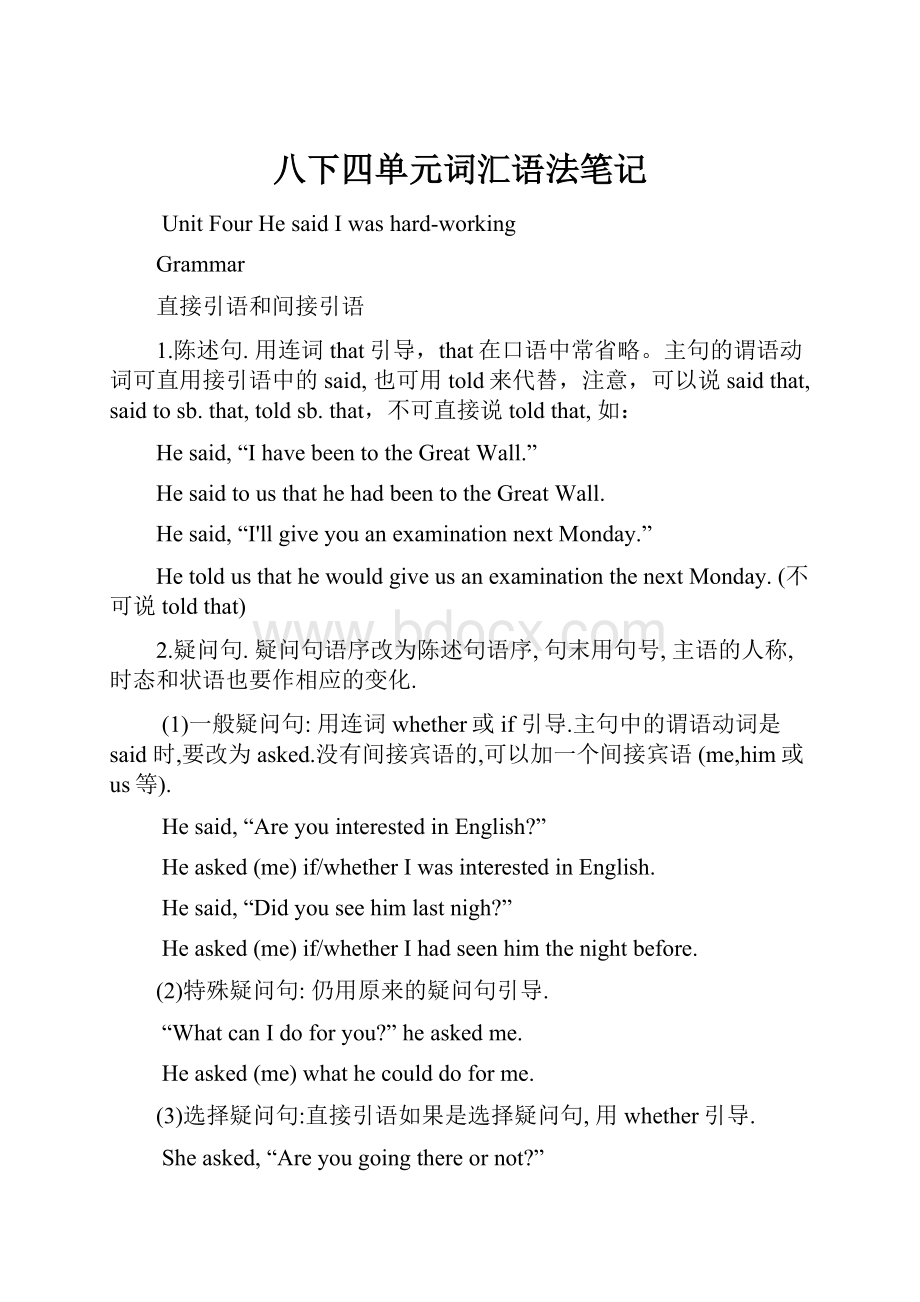 八下四单元词汇语法笔记.docx
八下四单元词汇语法笔记.docx
- 文档编号:12624707
- 上传时间:2023-04-21
- 格式:DOCX
- 页数:15
- 大小:23.95KB
八下四单元词汇语法笔记.docx
《八下四单元词汇语法笔记.docx》由会员分享,可在线阅读,更多相关《八下四单元词汇语法笔记.docx(15页珍藏版)》请在冰豆网上搜索。

八下四单元词汇语法笔记
UnitFourHesaidIwashard-working
Grammar
直接引语和间接引语
1.陈述句.用连词that引导,that在口语中常省略。
主句的谓语动词可直用接引语中的said,也可用told来代替,注意,可以说saidthat,saidtosb.that,toldsb.that,不可直接说toldthat,如:
Hesaid,“IhavebeentotheGreatWall.”
HesaidtousthathehadbeentotheGreatWall.
Hesaid,“I'llgiveyouanexaminationnextMonday.”
HetoldusthathewouldgiveusanexaminationthenextMonday.(不可说toldthat)
2.疑问句.疑问句语序改为陈述句语序,句末用句号,主语的人称,时态和状语也要作相应的变化.
(1)一般疑问句:
用连词whether或if引导.主句中的谓语动词是said时,要改为asked.没有间接宾语的,可以加一个间接宾语 (me,him或us等).
Hesaid,“AreyouinterestedinEnglish?
”
Heasked(me)if/whetherIwasinterestedinEnglish.
Hesaid,“Didyouseehimlastnigh?
”
Heasked(me)if/whetherIhadseenhimthenightbefore.
(2)特殊疑问句:
仍用原来的疑问句引导.
“WhatcanIdoforyou?
”heaskedme.
Heasked(me)whathecoulddoforme.
(3)选择疑问句:
直接引语如果是选择疑问句,用whether引导.
Sheasked,“Areyougoingthereornot?
”
SheaskedmewhetherIwasgoingthereornot.
3.祈使句:
改为tell,ask,ordersb(not)todosth句型,表示命令。
如:
"Don'tmakeanynoise,"theteachersaidtothestudents.
------Theteachertoldthestudentsnottomakeanynoise.
"Openthedoor,please,"shesaid.----Sheaskedhimtoopenthedoor.
4.Let's开头的祈使句,变为用“suggest+doing或+从句。
如:
Hesaid:
"Let'sgotothemovies."-----Hesuggestedgoingtothemovies.
Hesuggestedthattheyshouldgotoseethemovies.
5.感叹句,用what或how引导,也可用that引导,如:
Shesaid,“Whatalovelydayitis!
”
Shesaidwhatalovelydayitwas.或Shesaidthatitwasalovelyday.
三.间接引语中的呼应.
时态变化
例句
直接引语
间接引语
一般现在时→
一般过去时
Hesaid,“I’mafraidIcan’t
finishthework.
Hesaidthathewasafraid
hecouldn’tfinishthework.
现在进行时→
过去进行时
Hesaid,“I’musingtheknife.”
Hesaidthathewasusingtheknife.
现在完成时→
过去完成时
Shesaid,“I’venotheard
fromhimsinceMay.”
Shesaidthatshehadnot
heardfromhimsinceMay.
一般过去时→
过去完成时
Hesaid,“Icametohelpyou.”
Hesaidthathehad
cometohelpme.
过去完成时→
过去完成时
Hesaid,“Ihadfinished
myhomeworkbeforesupper.”
Hesaidthathehadfinishedhishomeworkbeforesupper.
一般将来时→
过去将来时
Shesaid,“I’lldoitafterclass.”
Shesaidthatshewould
doitafterclass.
1.人称的呼应
Hesaid,“Ilikeitverymuch.”
Hesaidthathelikeditverymuch.
Hesaidtome,“IbrokeyourCDplayer.”
HetoldmethathehadbrokenmyCDplayer.
2.时态的一致.
3.指示代词,时间状语,地点状语及动词的一致.
变化
例句
直接引语
间接引语
this→that
Shesaid,“I’llfinish
theworkthismorning.”
Shesaidthatshewould
finishtheworkthatmorning.
these→those
Hesaid,“Thesebooks
aremine.”
Hesaidthatthosebooks
werehis.
now→then
Hesaid,“It’snine
o’clocknow.”
Hesaidthatitwas
nineo’clockthen.
today→
thatday
Hesaid,“Ihaven’t
seenhertoday.”
Hesaidthathehadn’tseen
herthatday.
yesterday→
thedaybefore
Shesaid,“Iwent
thereyesterday.”
Shesaidthatshe
hadgonetherethedaybefore.
Tomorrow
thenext/day
Shesaid,“I’llgo
theretomorrow.”
Shesaidthatshewouldgo
therethenextday.
ago→before
Shesaid,“He
left30minutesago.”
Shetoldmethathehad
left30minutesbefore.
here→there
Hesaid,“Mysister
washereoneweekago.”
Hesaidthathissisterhad
beenthereoneweekbefore.
come→go
Shesaid,“I’llcome
herethisevening.”
Shesaidthatshewouldgo
therethatevening.
注意以下几种情况:
时态不变
1.直接引语是客观真理。
Theteachersaid,“Theearthmovesaroundthesun."
------Theteachersaidtheearthmovesaroundthesun.
2.直接引语是过去进行时,时态不变。
Jacksaid:
"IwasdoingchoreswhenTomcamein."
----JacksaidhewasdoingchoreswhenTomcamein.
3.直接引语中有具体的过去的某年某月某日,变间接引语时,时态不变。
Jacksaid:
"IwasbornonApril21,1980"--------JacksaidhewasbornonApril21,1980.
4.直接引语是一般现在时,表示一种反复出现或习惯性的动作时,变间接引语,时态不变。
Hesaid:
"Igetupatsixeverymorning."
-----Hesaidhegetsupatsixeverymorning.
5.如果直接引语中的情态动词没有过去时的形式或已经是过去时的形式,不用变。
Thedoctorsaid,"Youshouldstayinbedfor2days."
-----ThedoctorsaidIshouldstayinbedfor2days.
3.如何变状语。
时间状语由“现在”变为“原来”
直 接 引 语
间 接 引 语
now
then
today
thatday
thisevening
thatevening
yesterday
thedaybefore
yesterdaymorning
themorningbefore
lastnight
thenightbefore
twodaysago
twodaysbefore
nextweek
thenextweek/thefollowingweek
tomorrow
thenextday/thefollowingday
thedaybeforeyesterday
twodaysbefore
thedayaftertomorrow
intwodays`time/twodaysafter
Wordsandexpressions:
SectionA
1.anymoreadv.
Myfatherdoesn’tlivehereanymore.(该词可拆开为anymore,意思相同!
!
!
)
辨析not…anymore与not…anylonger
not…anylonger/nolonger一般强调时间和动作不再延续,常与状态动词和连续动词连用,
如wait,stay,be等.例如:
Iamnolongerlivinginthiscity.
not…anymore/nomore则强调数量,次数上不再增加和强调动作终止的结果,常与名词、瞬
间性动词连用,如:
hear,see,leave等.例如:
Thereisnomorewaternothefloor.
2.madadj.
bemadat=beangrywith.
例如:
Myteacherisoftenmadatme,becauseIdon’tworkhard.
MymotherismadatmeforwatchingTVtoomuch.
Youmustbemadtosayso.
常见的搭配有:
getmad疯狂,变得恼怒
bemadabout…对......着迷
becrazyabout----更贴近一种主观爱好。
3.message
message是可数名词,意为"消息,信息,口信".
(1)takeamessageforsb.帮。
。
。
给。
。
。
捎一个口信
e.g.Doyouneedmetotakeamessageforyou?
(2)givesb.amessage为某人捎个口信
(3)leaveamessageto/forsb.给某人留个口信
e.g.Heleftamessageforussayingthathewouldcomelate.
4.suppose
(1)suppose+that从句
e.g.Wesupposethatthesituationwillimprove.
特别提醒suppose后面接宾语从句时,如果从句是表示否定意义的句子,要否定主句.(think,believe,suppose,expect是I/We为主语的否定前置。
)
e.g.Idon’tsupposeI’lltroubleyouagain.
(2)suppose+宾语+宾补(不定式,形容词或介词短语)
e.g.Isupposehimintheoffice.
(3)be(not)supposedto意为"应当......"----should(n’t)do…
e.g.You’renotsupposedtoplayfootballintheclassroom.
Everyoneissupposedtoobeythetrafficrulesandtherewillbefeweraccidents.
(4)Isupposeso/not.
(5)(用于祈使语气)让...[+(that)]
Supposewesetoutatsix.
我们六点动身吧。
(6)假定[+(that)][O2]
Supposethecarshouldbreakdown
5.Firstofall,MarintoldBenshewashavingasurprisepartyforLana.
强调重要性,用于说明事物排列顺序时的"首先,第一",近义的短语还有tobeginwith
辨析:
atfirst与first
Atfirst也为"首先",但更强调"起初",一般暗示在事情发生后会渐有变化.例如:
e.g.Atfirst,theydidn’tbelieveus.
First为"首先",常用于列举做事的顺序"第一",有时可与firstofall替换,例如:
First,cutupthreeapples.
6.YouwantBtopassthismessagetoC.
(1)passsb.sth.=passsth.tosb.
Hepassedabooktome.=Hepassedmeabook.
(2)passalong/by/through
Abuspassedbyjustamomentago.
Theypassedthroughthevillageyesterday.
(3)pass
Howshallwepassthesummerholiday?
=spend
Aweekpassedquickly.
Oneandhalfayearhaspassedsincewewenttomiddleschool.
7.YouareatB’shouseworkingonahomeworkproject.
workon有两种含义,一是"继续工作",此时on是副词,二是"从事于......",此时on是介词.
例如:
Heisworkingonacomputer.他正在操作一台电脑.
Theyworkedontillsunset.他们一直工作到日落.
拓展:
workat意为"从事于,致力于",可以分开使用.例如:
He’sworkingatanewinvention.他正致力于一项新发明.
SectionB
1.nervous----morenervous,mostnervous.
----nerven.神经----nervousnessn.神经紧张,不安
benervousof/about意为"对......感到紧张"
getnervous变得紧张,焦虑
例如:
anervouswoman一个神经质的女人
Bobwasnervouswhenhestoodinthefrontoftheclassroom.
2.true(adj.)----truthn.----trulyadv.
atruestory
e.g.ItistruethathewenttoBrazil.
(1)cometrue
e.g.Onedaymydreamwillcometrue.
(2)truly(adv.)
e.g.Pleasespeaktruly.
That’satrulywonderfulplan.
(3)truth(n.)真实;真理;
e.g.Myfathersaysthatthetruthwillcomeoutintheend.
Haveyoudoneit?
Tellmethetruth.
3.IalwaysgetnervouswhenIseetheenvelopefromschoolinthemail,…
作连系动词,意为“变成,变得”,其后接形容词.getnervous意为“变得紧张”.例如:
It’sgettingdarkeranddarkeroutside.外面变得越来越暗.
I’mgettingready.我准备得差不多了.
You’dbettertakeanumbrellawithyouifyoudon’twanttogetwet.
4.haveahardtime为固定短语,意为“费事,费劲”,
havea+adj.+timewithsth.
havea+adj.+timedoingsth.
IhadahardtimepassingtheEnglishtest.
Hehadahardtimewiththenoisychildren.
5.It’sjustthatIfindsciencereallydifficult.
It’sjustthat…意为“这只是(因为)……”,其中that引出一种原因,有时还可以直接以justthat引起一个独立的句子.例如:
e.g.Nothingimportant.It’sjustthathe’sabitupsetaboutlosingthegame.
It’snothing,really.Justthatshedidn’tdowellinthematchasshehadexpected.
6.disappointv.。
。
。
使。
。
。
失望----disappointedadj.
----disappointingadj.
人+bedisappointedatsb/sth.
It’sdisappointingthat+从句。
。
。
Whatdisappointingexamresults!
e.g.Yourhomeworkdisappointedme.
Mikeisquitedisappointedathisdisappointingachievementsinfinalexams.
It’sdisappointingthatLiuXiangquithismatchinthe2008OlympicGames.
7.luckn.---luckyadj.---luckier/luckiest---luckilyadv.
Goodluck!
/Badluck!
Goodlucktosb.withsth.
beluckytodo…
Luckily/Unluckily,….(做状语修饰整个句子)
---近义词Fortunately,/Unfortunately,
8.own----ownern.拥有者
(1)adj.与物主代词连用my/his/ourown…
myownbook=thebookofmyown
(2)v.---havee.g.Heownsabighousewithalovelyrosegarden.
(3)n.dosth.onone’sown=dosth.byoneself
9.copyv.&n.
e.g.Youarenotsupposedtocopyanyoneelse’shomework.
ShecopieseverythingIdo.
Thepaintingisonlyacopy=(afakeone),nottheoriginalone.
10.getoverthedifficulties克服困难(动词+介词的结构)
e.g.Althoughthejobishard,IbelieveIcangetoverit.
其它的动词+介词结构:
getonit/workonit
SelfCheck
1.if与whether
(1)if与whether都有"是否"之意.在一些情况下可以互换.例如:
Idon’tknowif/whetherhe’llcometomorrow.我不知道明天他是否会来.
(2)在下列情况下只能用whether,不能用if:
①在带to的不定式前.例如:
Ihaven’tdecidedwhethertowalkthereornot.
②在介词后面.例如
- 配套讲稿:
如PPT文件的首页显示word图标,表示该PPT已包含配套word讲稿。双击word图标可打开word文档。
- 特殊限制:
部分文档作品中含有的国旗、国徽等图片,仅作为作品整体效果示例展示,禁止商用。设计者仅对作品中独创性部分享有著作权。
- 关 键 词:
- 八下四 单元 词汇 语法 笔记
 冰豆网所有资源均是用户自行上传分享,仅供网友学习交流,未经上传用户书面授权,请勿作他用。
冰豆网所有资源均是用户自行上传分享,仅供网友学习交流,未经上传用户书面授权,请勿作他用。


 《阿凡达》观后感.docx
《阿凡达》观后感.docx
